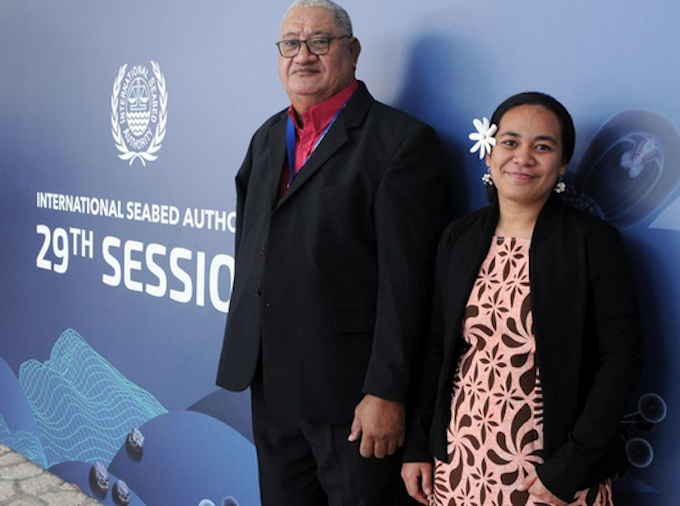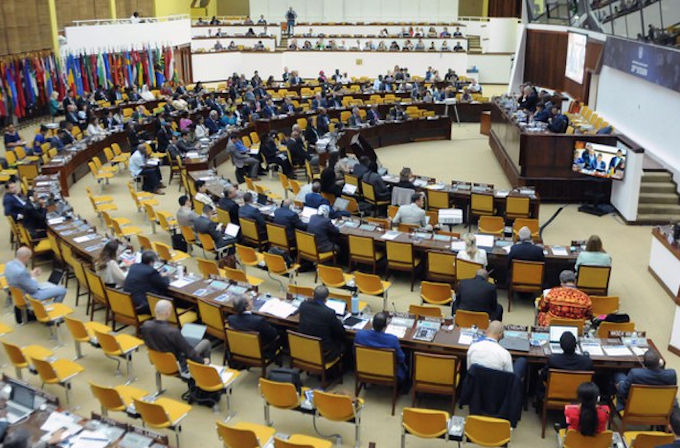
SPECIAL REPORT: By Stephen Wright in Kingston, Jamaica
The obscure UN organisation attempting to set rules for the exploitation of deep-sea metals is facing a potential shake-up as more nations call for a mining moratorium and a new candidate for its leadership vows to address perceptions of corporate bias.
The number of countries against the imminent start of mining for metallic nodules on the seafloor has jumped to 32 during the International Seabed Authority’s annual assembly this week in Kingston, Jamaica after Austria, Guatemala, Honduras, Malta and Tuvalu joined their ranks.
“We are running ahead of ourselves trying to go and extract minerals when we don’t know what’s down there, what impact it is going to have,” said Surangel Whipps, president of the Pacific island nation of Palau.
- READ MORE: Vanuatu fights for marine protection at key UN deep-sea mining summit
- Tuvalu joins growing Pacific tide of opposition to deep-sea mining
- Other deep-sea mining reports
As governments become more aware of the risks, “hopefully we get them motivated to say let’s have a pause, let’s have a moratorium until we understand what we are doing,” he told BenarNews.
Tuvalu delegates Monise Laafai and Demi Afasene declared their country’s support for a precautionary pause on deep-sea mining, pictured on July 30, 2024. [IISD-ENB]
Ten members of the 18-nation Pacific Islands Forum (PIF), including the territories of New Caledonia and French Polynesia whose foreign policies are set by France, are now opposed to any imminent start to deep-sea mining.
Mining of the golf ball-sized nodules that litter swathes of the sea bed is touted as a source of metals and rare earths needed for green technologies, such as electric vehicles, as the world reduces reliance on fossil fuels.
Irreparable damage
Sceptics say such minerals are already abundant on land and warn that mining the sea bed could cause irreparable damage to an environment that is still poorly understood by science.

Brazil has nominated its former oil and gas regulator Leticia Carvalho, as its candidate for ISA secretary-general, challenging the two-term incumbent Michael Lodge. He has been criticized for his closeness to The Metals Company, which is leading the charge to hoover up the metallic nodules from the seabed.
Carvalho, a former oceanographer and currently a senior official at the UN Environment Program, said a third consecutive term for Lodge would be inconsistent with “best practices” at the UN

“I would be guided by integrity as a value,” she told BenarNews. “Secondly the secretary-general function, it’s a neutral function. You are a civil servant, you are there to set the table for the decision makers, which are the state parties.”
“I have learned in my life as a regulator that you try to find by consensus, balances – what you agree collectively to protect and what you agree to sacrifice,” Carvalho said.
Lodge has been nominated by Kiribati, one of three Pacific Island nations that The Metals Company is working with to harvest vast quantities of nodules from their areas in the Clarion-Clipperton Zone.
The 4.5 million square kilometer [1.7 square million mile] area in the central Pacific is regulated by the ISA and contains trillions of polymetallic nodules at depths of up to 5.5 kilometers. All up, the ISA regulates more than half of the world’s seafloor.
Dropped out
Carvalho said she was present at a meeting at the UN in New York last month, first reported by The New York Times, when Kiribati’s ambassador to the UN. Teburoro Tito, proposed to Brazil’s ambassador that Carvalho drop out of contention for secretary-general in exchange for another senior role at the ISA.
Lodge has said he was not involved in that proposal and also denied the concerns of some ISA delegates that his travel this year to nations including China, Cameroon, Japan, Egypt, Italy and Antigua and Barbuda was a re-election campaign using ISA resources.

“Mr Lodge has no comment on any questions concerning hearsay,” the ISA said in a statement. “Mr Lodge was not privy to the discussions referenced and is not party to the alleged [Kiribati] proposal.”
Deep-sea mineral extraction has been particularly contentious in the Pacific, where some economically lagging island nations see it as a possible financial windfall, but many other island states are strongly opposed.
Nauru President David Adeang told the assembly that its mining application currently being prepared in conjunction with The Metals Company would allow the ISA to make “an informed decision based on real scientific data and not emotion and conjecture”.
Nauru in June 2021 notified the seabed authority of its intention to begin mining, which triggered the clock for the first time on a two-year period for the authority’s member nations to finalise regulations.
Through deep-sea mining, Nauru, home to some 10,000 people and just 21 square kilometers in area, would contribute critical metals and help combat global warming, Adeang said.

Image: Diego Noguera/IISD-ENB/BenarNews
‘Necessity’ for our survival
“The responsible development of deep sea minerals is not just an opportunity for Nauru and other small island developing states,” he said. “It is a necessity for our survival in a rapidly changing world.”
Still, a sign of how little is understood about deep sea environments came earlier this month when scientists published research that showed the metallic nodules generate oxygen, likely through electrolysis.
It was an own-goal for The Metals Company, which partly funded the research in Nauru’s area of the Clarion-Clipperton Zone. It quickly attacked the results as based on flawed methodology.
“Firstly it’s great that through our funding this research was possible. However we do see some concerns with the early conclusion and will be preparing a rebuttal that will be out soon,” chief executive Gerard Barron told BenarNews.
Among the other 32 nations at the 169-member ISA supporting a stay on deep-sea mining are Brazil, Canada, Chile, Federated States of Micronesia, Fiji, France, Germany, Mexico, New Zealand, Palau, Samoa, United Kingdom, and Vanuatu.
Copyright ©2015-2024, BenarNews. Republished with the permission of BenarNews.












































